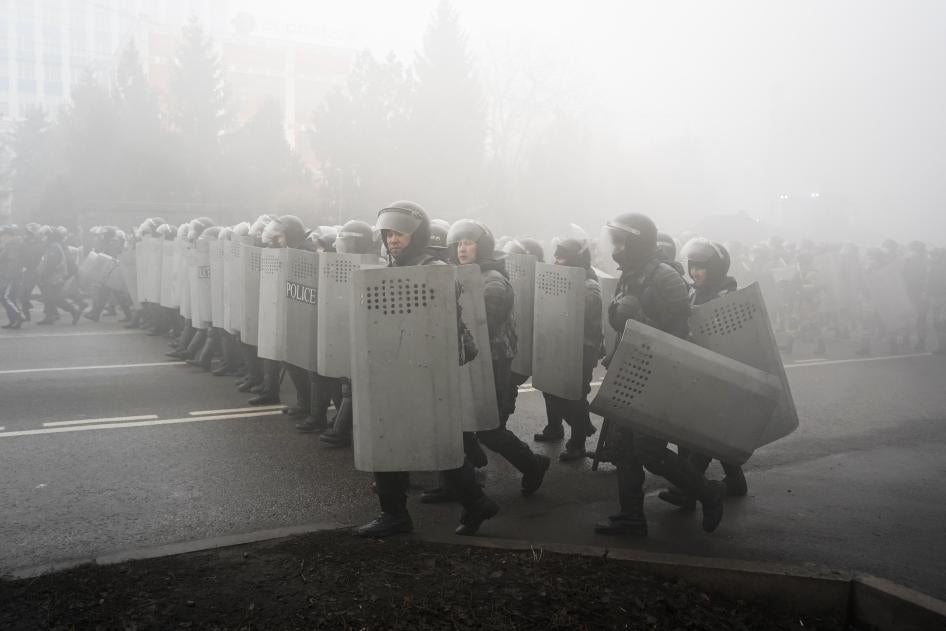(Berlin, January 12, 2023) – Authorities in Kazakhstan, Uzbekistan, and Tajikistan used unjustified lethal force to respond to protests in 2022 and have utterly failed to ensure accountability for a multitude of human rights violations, Human Rights Watch said today in its World Report 2023. Hundreds of protesters were killed or suffered serious injuries in the violence.
Dozens of civilians also died during armed clashes in September at the border between Tajikistan and Kyrgyzstan, where in October, the human rights situation took a notable turn for the worse after Kyrgyz authorities began a concerted crackdown on activists and shuttered independent media. Turkmenistan has taken no steps to account for dozens of people who have been forcibly disappeared or held in incommunicado detention.
“Reform claims by Central Asian leaders ring hollow in the face of impunity for serious human rights violations committed by law enforcement officials,” said Hugh Williamson, Europe and Central Asia director at Human Rights Watch. “If Central Asian governments want to turn a page on the violent suppression of protests and other grave human rights abuses that occurred in 2022, they should stop ignoring calls for independent investigations and accountability,”
In the 712-page World Report 2023, its 33rd edition, Human Rights Watch reviews human rights practices in close to 100 countries. In her introductory essay, acting Executive Director Tirana Hassan says that in a world in which power has shifted, it is no longer possible to rely on a small group of mostly Global North governments to defend human rights. The world’s mobilization around Russia’s war in Ukraine reminds us of the extraordinary potential when governments realize their human rights obligations on a global scale. The responsibility is on individual countries, big and small, to apply a human rights framework to their policies, and then work together to protect and promote human rights.
The consequences of Russia’s full-scale invasion of Ukraine exacerbated tensions and uncertainty in the region. In this context, some Central Asian states sought to deepen ties with Europe and other Western countries. However, without accountability for serious rights abuses, genuine partnerships will remain elusive.
In Kyrgyzstan, media freedom came under siege with a spate of criminal cases against independent journalists, bloggers, and media. In October, more than 20 civil society activists, journalists, and politicians were arrested and sent to pretrial detention for two months after they publicly opposed a government agreement transferring an important dam to Uzbekistan. In November, the authorities introduced a d> raft law on nongovernmental organizations that is likely to impose severe and undue burden on the operation of these groups and hinder their activities.
In Turkmenistan, Serdar Berdymukhamedov took office as president, succeeding his father in a sham election in March. Under Berdymukhamedov’s leadership, Turkmenistan remained a severely repressive authoritarian state. Enforced disappearances, a dire human rights violation in which the government refuses to acknowledge that a person is being held, persisted and dozens of people presumably remained behind bars without any contact with their family or lawyers. The government failed to acknowledge or adequately address growing poverty in the country and mismanaged its response to grave food insecurity. The authorities continued to heavily restrict and monitor access to media and information and violated people’s right to freedom of movement.
Tajikistan intensified its crackdown on human rights and fundamental freedoms, violently repressing peaceful gatherings in the Gorno-Badakhshan Autonomous Oblast against perceived harassment and persecution. At least 40 people were killed as a result of the violence, including in clashes with security forces. More than 200 people were detained in connection with the protests and some faced unfair trials, receiving prison terms of up to 18 years or life sentences. The authorities have also used trumped-up charges against human rights defenders and journalists in retaliation for their professional activities.
Kazakhstan has rejected repeated calls for an independent investigation into the wave of protests in January while failing to ensure accountability for the 238 people who were killed and the scores of people who were arbitrarily arrested, detained, ill-treated, and tortured. Longstanding violations persisted, including the authorities’ crackdown on government critics using overbroad “extremism” charges, and undue restrictions on peaceful protests, independent trade union organizing, free speech, and women’s rights. President Kassym-Jobart Tokaev was re-elected to a 7-year term on November 20.
In Uzbekistan, the prosecution of bloggers, including Miraziz Bazarov, Otobek Sattoriy, and Fazilhoja Arifhojaev, highlighted the decline of freedom of expression in the last year. In July, Uzbek security forces used unjustified lethal force in response to mostly peaceful protests in the autonomous region of Karakalpakstan. A trial of some of the protesters opened in November, but there remained a lack of accountability for the 21 people killed and dozens who were seriously wounded. Long-promised legal reforms, including new Criminal and Nongovernmental Organization Codes, continued to be stalled.









